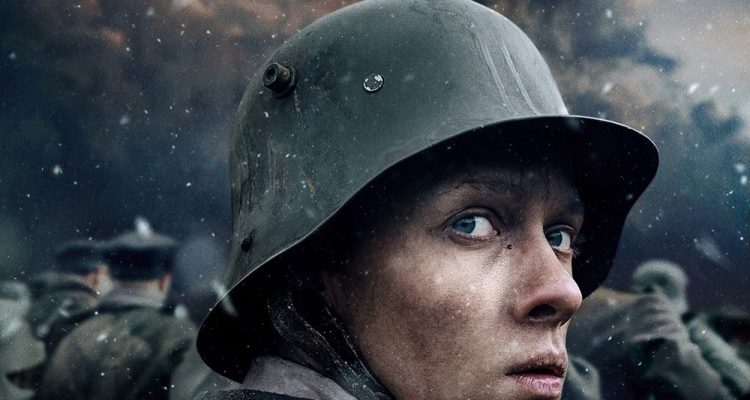Collecting an impressive seven BAFTA wins, including Best Film and Best Film Not in the English Language, Netflix’s “All Quiet on the Western Front” is peaking at just the right time with final Oscar voting around the corner.
Having come late to the film, I found even greater detail during this second viewing prompted by the BAFTA wins. It’s important to note that this 2022 film was adapted from a book written by a disillusioned German war veteran. That book was previously adapted into a film of the same name, “All Quiet on the Western Front,” which won Best Picture and Best Director at the 1930 Academy Awards.
Helmed by BAFTA winning director Edward Berger, this 2022 film adaptation is a visceral depiction of a near century old tale with some of the finest cinematography in recent memory. Berger and his team of Oscar nominated below the line talent create a world where you completely connect with these tortured soldiers.
Particularly impactful are the film’s first scenes, long before the young soldiers arrive on the battlefield. You see young, innocent boys who are enthralled with the free-flowing propaganda coming out of Germany. They attend a rally and miss all the warning signs of the impending hell they’re running toward with open arms.
The most haunting example of the first act occurs when one of the new recruits is issued his army uniform. The future soldier mentions that there’s a mistake and there’s already a name in his uniform that’s not his. The superior officer makes some excuse and rips out the name tag, only to drop it on the floor once the recruit leaves. The camera reveals dozens of name tag across the floor, it’s far more disturbing than if 1,000 CGI bodies were piled up in the corner.
Once the new soldiers arrive on the battle field, the heavy losses pile up quickly. The elder statesmen on the battle field are broken men and leave little hope for the young men hoping to survive the war. From the falling rain to falling artillery shells, the grim setting is unrelenting on these soldiers and unimaginable tragedy stacks up until the recruits.
The recruit at the center of the film is Paul Baumer (Felix Kammerer), barely out of his teenage years and marching on Paris with his German friends. The naive jubilant energy that Paul and his friends exuded in the opening minutes is long gone after their first minutes on the frontline trying to bail water out of the trenches with their helmets.
Paul’s friends die one after the other, but somehow this malnourished lad survives over a year on the battlefield, forming a bond with the older soldier named Katczinsky, or Kat (Albrecht Schuch).
Kat is a veteran soldier with a hollowed out soul who has somehow endured the hellish landscape without taking his own life. Berger and the writers use Paul’s innocent blue eyes in direct contrast with Kat’s grizzled visage, and it’s a great relationship to explore on camera.
The film has its strongest impact when indulging in moments of tragic humanity. When Paul find himself in a crater with an enemy that he’s stabbed enough to fatally wound, Paul watches the enemy soldier slowly die. In that moment, he sees the same fear that he’s seen on his comrades faces when they’re dying. It’s a moment that underscores the senseless loss of war and the universal mental destruction that accompanies the physical wounds.
On the topic of score, BAFTA winning composer Volker Bertelmann crafts a sonic landscape that demands attention in the film. Much like another one of this year’s highly praised foreign films, “RRR,” the score here doesn’t simply support the imagery on film — it acts like a jockey driving a racehorse down the racetrack. The score and sonic landscape are work in contrast while at the same time being harmoniously linked under Berger’s direction.
Having been adapted previously, the new elements added by Berger and company are worth noting. There’s a subplot featuring actor Daniel Bruhl as a German official trying to negotiate an armistice, which the German military are not in favor of pursuing. General Friedrich (Devid Striesow) is hellbent on sending his troops to certain death and because of the time frame of the deal, he’s able to do just that.
The film ends in a way that shows nearly every soldier died on that battlefield, whether they lost their pulse or returned home with a beating heart and eviscerated soul. The nine Oscar nominations and seven BAFTA wins (winning half of its fourteen nominations) underscores the level of artistry on display from the above and below the line on this film. The marriage of sound design and cinematography captures beauty and horror in an equally majestic way. The production design has an authenticity that is paramount to the film’s engrossing nature and Berger’s direction is in a class of its own. The film is powerful reminder that the events of the past can be as compelling and relevant today as they were 100 years ago.
Letter Grade: A


